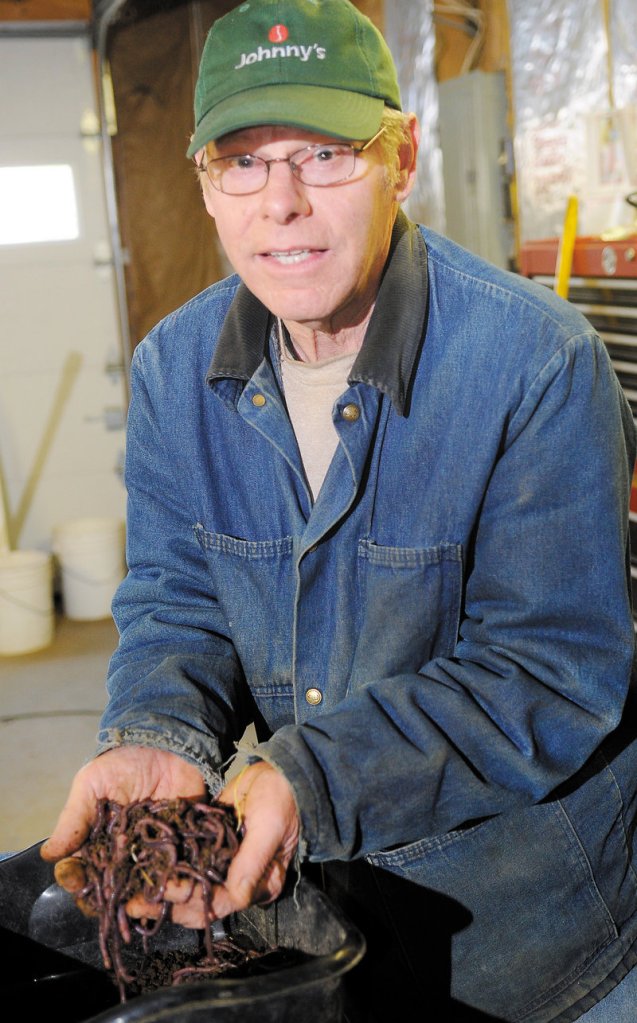READFIELD – There’s gold in that there poop.
Maybe that’s because it doesn’t look like poop, smell like poop or act like poop — when it comes from a worm.
That’s part of the beauty of jumping into the worm casting business, Richard Reed said.
“The fertilizer is great for seed starting, indoor and outdoor flowers, plants, lawns and vegetables,” Reed said. “A lot of greenhouses are buying this stuff by the ton.”
Reed, who owns R&L Berry Farm with his wife, Leane Reed, got into the worm casting business last fall, when he said a large portion of his honeybee population was wiped out by an early spring. The die-off put a crimp on an already tight budget.
“I knew things would be down, so I needed a filler,” Richard Reed said.
Reed, 65, is a regular at the Winthrop Farmers Market. It was there one day that he overheard someone talking about worm castings. Reed remembered the conversation when he went looking to supplement his income.
“I started by doing research online,” he said. “I started finding different ways of doing it.”
Unfortunately, none of those ways would really work in a cold climate.
Then he stumbled across Wisconsin-based Unco Industries, owner of the Wiggle Worm Soil Builder line.
“You can do this in a one-bay garage,” Reed said.
Unco’s system is not only friendly to cold climates, but it also allows farmers to calculate labor and raw material to better keep on budget.
“The results are more balanced,” Reed said.
He purchased his supplies and set up shop last fall. He is now Unco’s only commercial producer of “cultured night walker castings” in Maine.
“They’re probably more cultured than me,” Reed joked.
Reed started with 5,000 worms, each between 4 and 5 inches.
He now has about 6,000.
The worms are separated into groups of about 250 and placed into three half-gallon buckets. The worms are fed a special grain protein mix along with the soil and compost bedding in which they are housed for two weeks.
“After two weeks, the worms are fed again, because they have eaten all their food,” Reed said. “They are then put in new soil and feed.”
The process continues for about 28 weeks, at which the point the worms, now 6 to 8 inches in length, have little value for producing castings. The critters are sold as bait and replaced by younger worms, most of which will eventually come from eggs supplied by the outgoing worms.
Reed says he averages about 10 hours per week tending to the worms, which is a little more than he had anticipated. He sometimes has help from his pastor’s 16-year-old son. Reed said he is looking for ways to make the process less labor-intensive and has considered selling the operation to his teenage assistant.
Reed keeps his garage a toasty 72 degrees with a pellet stove.
It’s a good temperature for the worms, and happy worms mean many castings.
“Once in a while, it gets a little too hot and they try to get out,” Reed said.
The worms also disapprove of bright lights and vibrations.
That sometimes poses a problem when Reed has to open his garage door.
“I have to open up the garage door every now and then,” Reed said. “They’re going to have to get over it.”
Apparently the worms are adjusting well. They produce a staggering 800 to 1,100 pounds of fertilizer every two weeks.
The castings are filtered from the worms, loam and compost through a two-stage screening process.
Interestingly, the worms are very tidy with their castings, preferring to rise to the surface to do their business on top of the soil rather than underneath the surface.
“It’s just like you when you go to the bathroom,” Reed said. “You don’t go all over the house. They come to the surface to poop.”
The castings are placed into sealed bags of 1 to 30 pounds and sold wholesale and retail. Reed sells the castings at his farm on Berry Road, and on eBay.
The product also has drawn interest from Longfellows Greenhouses in Manchester and from a greenhouse in Unity.
The castings retail for $1.99 per pound.
“It’s a matter of getting time to get to all the stores,” Reed said.
The castings, which have no smell and don’t leave a residue when picked up by hand, look like little pellets.
When added to the soil, those pellets act like wood blocks in a bucket, creating lots of air pockets for the free flow of nutrients and water. The castings themselves act as a fertilizer.
“It’s clean, there’s no odor, and a little bit goes a long way,” Reed said.
He knows from experience. He added castings to a spinach plant last fall and has been thrilled with the results.
“You ought to see it,” he smiled. “It’s gigantic.” Apparently the worms are adjusting well. They produce a staggering 800 to 1,100 pounds of fertilizer every two weeks.
Send questions/comments to the editors.



Success. Please wait for the page to reload. If the page does not reload within 5 seconds, please refresh the page.
Enter your email and password to access comments.
Hi, to comment on stories you must . This profile is in addition to your subscription and website login.
Already have a commenting profile? .
Invalid username/password.
Please check your email to confirm and complete your registration.
Only subscribers are eligible to post comments. Please subscribe or login first for digital access. Here’s why.
Use the form below to reset your password. When you've submitted your account email, we will send an email with a reset code.